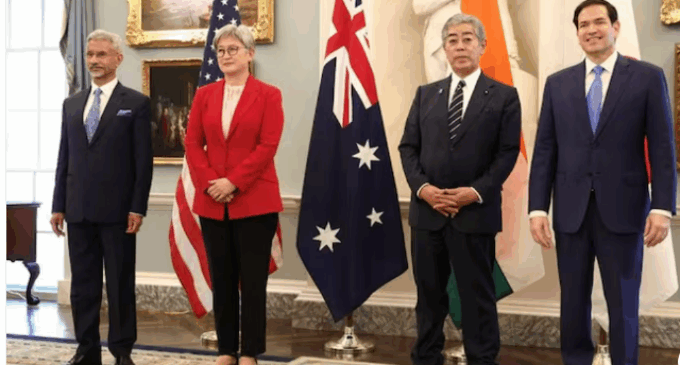India’s three QUAD partners USA, Australia and Japan ignored on Tuesday Indian foreign minister Dr. S Jaishankar’s appeal ahead of the four nation QUAD foreign ministers meeting to understand and appreciate that India will exercise its right to defend its people against terrorism. Jaishankar did not specifically mention Pakistan but it was apparent. But the joint statement of the four foreign ministers while condemning the Pahalgam terror attack in strongest terms calling for the perpetrators of the attack to be brought to justice without any delay, also ruled out any unilateral action to change status quo.
QUAD is the grouping of the four countries USA, Japan, Australia and India meant for protecting the security in the Indo-Pacific region. The bloc is aimed at meeting the challenge of China in the Asia-Pacific region. The USA was very happy to get India in this new group after Narendra Modi became the Prime Minister. PM Modi also has been taking deep interest in the functioning of QUAD minimizing India’s role in other two regional blocks SCO and BRICS.
QUAD held a meeting of the foreign ministers on July 1 in Washington as a forerunner to the summit that is expected to be held in India by the end of this year. President Donald Trump along with the two other Prim Ministers of Australia and Japan are expected to attend the summit to be hosted by the Indian Prime Minister. India had positive expectations from the other QUAD members about support to India’s position against Pakistan on the issue of terror, but those were belied after the Washington meeting.
The joint statement did not give any indication that Pakistan had any role in the terror attack at Pahalgam on April 22 killing 26 persons. The condemnation was in general terms and it was issued after the meeting of four foreign ministers Marco Rubio of USA, Penny Wong of Australia, Iwaya Takeshi of Japan and Dr. S Jaishankar of India. Since Rubio was the host, it was natural that he played a major role in drafting the statement and finalized it within his existing framework of equating India with Pakistan relating to Operation Sindoor.
The US state secretary was more concerned with focusing on the threat from China and that covered a lot of space in the joint statement. Without directly naming China, the statement expressed serious concerns about the situation in the East China Sea and South China Sea, describing acts of coercion and militarization in the region, as well as the restrictions on critical supply chains.
The QUAD ministers said that they strongly oppose any unilateral actions that seek to change the status quo by force or coercion in the Indo-Pacific. This assertion is not only aimed at China but also against India as the Prime Minister Narendra Modi has talked of the unilateral right of India to take action against Pakistan. In fact this is repudiation of the three point New Normal doctrine of Narendra Modi which Dr. Jaishankar articulated in his address ahead of the summit.
What does it mean for India? At the meeting of the so-called friends led by the USA, the Indian foreign minister has been compelled to be the signatory to a statement which repudiates the Narendra Modi doctrine. India did not have any gains from this QUAD meet. Instead India became a party to the US’s global strategy on China in Indo-Pacific. Marco Rubio in the style of his boss Trump hijacked the agenda suiting the geopolitical interests of the USA without taking any care of Indian feelings about the continuing presence of the terror groups in Pakistan. To Rubio and also Donald Trump, Modi doctrine is of no relevance in their understanding of India-Pakistan relations.
The statement issued in Washington was the second time in the last two weeks that India faced a diplomatic defeat in respect of the Prime Minister’s position on terror inspired by Pakistan. At the SCO meeting last month, the draft statement issued by ten members of the summit did not mention Pahalgam as a terror action by name but included Balochistan at the instance of the member Pakistan. Indian defence minister Rajnath Singh refused to sign the statement, so it was not issued officially. But the SCO summit in China revealed the stark failure of Indian diplomacy in convincing the foreign countries that Pakistan was still backing the terror.
Now the next test of Indian diplomacy will be in Brazil at the BRICS meeting on July 6 and 7 this year. Prime Minister left on a five nation tour including attending BRICS meeting on July 2. He will be reaching Rio de Janeiro for the BRICS meeting. Indian foreign ministry officials have to ensure that the BRICS members understand the Indian position on terror and that is effectively reflected in the joint declaration to be issued from the summit. BRICS can not be allowed to go the way of SCO and QUAD. (IPA Service)




 Trump’s Tariff Bombs Often Fail To Explode; Latest 500% May Also Fail To Fire
Trump’s Tariff Bombs Often Fail To Explode; Latest 500% May Also Fail To Fire 